 It is hard to believe it has been a year since davidbrubeck.com launched “Seven Positions” with an interview of bass trombonist Charles Vernon. Our first “partial” is complete and we would like to extend our most sincere gratitude and appreciation to our first respondents. They have been gracious, giving and kind. It is difficult to imagine a more distinguished list: The extraordinary bass trombone soloist and member of the Chicago Symphony Orchestra, Charles Vernon; an astonishingly accomplished young bass trombonist who is a recorded soloist and performs with the Boston Symphony Orchestra, James Markey; the incomparable jazz bass trombone soloist, bassist, composer and leader of the Brubeck Brothers jazz quartet, Chris Brubeck; Professor of Trombone at ASU, inspiring soloist, former bass trombonists with the Boston Symphony Orchestra and visionary internet pioneer, Doug Yeo; a fresh voice and perspective on classical music for this generation and bass trombonist of the New World Symphony, Jeremy Morrow; trailblazing bass trombone recitalist, scholar, founder of the International Trombone Association and former Professor at Harvard University, Thomas Everett; and remarkable bass trombone soloist, member of the St. Louis Symphony and her trombone quartet, Gerry Pagano. What follows is small sample, or appetizer, with each interview interwoven with highlights from the first year of “Seven Positions”.
It is hard to believe it has been a year since davidbrubeck.com launched “Seven Positions” with an interview of bass trombonist Charles Vernon. Our first “partial” is complete and we would like to extend our most sincere gratitude and appreciation to our first respondents. They have been gracious, giving and kind. It is difficult to imagine a more distinguished list: The extraordinary bass trombone soloist and member of the Chicago Symphony Orchestra, Charles Vernon; an astonishingly accomplished young bass trombonist who is a recorded soloist and performs with the Boston Symphony Orchestra, James Markey; the incomparable jazz bass trombone soloist, bassist, composer and leader of the Brubeck Brothers jazz quartet, Chris Brubeck; Professor of Trombone at ASU, inspiring soloist, former bass trombonists with the Boston Symphony Orchestra and visionary internet pioneer, Doug Yeo; a fresh voice and perspective on classical music for this generation and bass trombonist of the New World Symphony, Jeremy Morrow; trailblazing bass trombone recitalist, scholar, founder of the International Trombone Association and former Professor at Harvard University, Thomas Everett; and remarkable bass trombone soloist, member of the St. Louis Symphony and her trombone quartet, Gerry Pagano. What follows is small sample, or appetizer, with each interview interwoven with highlights from the first year of “Seven Positions”.
1st Position Jeremy Morrow
What do you look for in an instrument?
 It’s really quite simple for me. I play on whatever is the vehicle for my best sound. Smart practice and expressive intent makes a good instrument have the sound I desire.
It’s really quite simple for me. I play on whatever is the vehicle for my best sound. Smart practice and expressive intent makes a good instrument have the sound I desire.
1st Position Tom Everett
What do you look for in an instrument?
Instrument choices are of course guided by the player’s personal concepts, priorities and demands for the ensembles and styles they perform. In general, I would look for an instrument that was comfortable to play, both in the physical feel (balance and left hand comfort) and ease of playing (sound production/response). The single most important concern is the sound/tone quality produced on the instrument. Was the tone centered/focused, yet flexibly?  My personal bass trombone tone concept and playing situations led me to choose an instruments that produced a dark/mellow sound that would blend well in section playing. Next is the tuning (overtone series, alternate positions) and consistency of response throughout all registers.
My personal bass trombone tone concept and playing situations led me to choose an instruments that produced a dark/mellow sound that would blend well in section playing. Next is the tuning (overtone series, alternate positions) and consistency of response throughout all registers.
2nd Position James Markey
How do you conceive of an ideal tone quality?
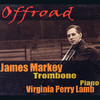 Good question. I like to think of tone as not born in a vacuum! We need to listen to recordings of people, brass players and non-brass players alike, and listen for some of the characteristics of sound that make them sound beautiful. Every instrument/player at the highest level has both breadth of sound AND clarity of sound. The mix changes among instrumental groups and families, but there’s still a mix. The more we hear others play, the better idea we have in our head of what a beautiful sound is.
Good question. I like to think of tone as not born in a vacuum! We need to listen to recordings of people, brass players and non-brass players alike, and listen for some of the characteristics of sound that make them sound beautiful. Every instrument/player at the highest level has both breadth of sound AND clarity of sound. The mix changes among instrumental groups and families, but there’s still a mix. The more we hear others play, the better idea we have in our head of what a beautiful sound is.
2nd Position Chris Brubeck
How do you conceive of (describe/visualize) an ideal tone quality for each instrument?
There are lots of wonderful and different approaches to making a sound on the instrument. I would add from a personal taste perspective that I don’t like the diaphragm vibrato approach so much. I believe that the trombone is the only Western brass instrument that HAS the ability to create a vibrato with a slide. I often think about how much I love recordings of the Hammond B3 and how the spinning Leslie speaker kicks in at different times to add 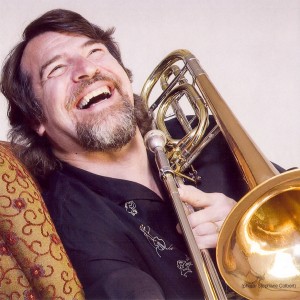 expression to the music. We “spin” our sound as brass players too and I think it is an appropriate tool to use on the trombone varying a straight tone or a slight vibrato to end a phrase. That notion comes a lot from hearing Paul Desmond on the alto sax all my life and checking out how he lyrically tapered his phrase ends. I loved J.J. Johnson’s sound and had a book by him when I was starting out. By contrast I totally love Wycliff Gordon’s “rough and tumble” approach as well. What I also really like and strive for is a big Classical music taboo. In the same way that I like the coarse sound of a singer like Joe Cocker over Johnny Mathis, I like to hear notes “split” and 2 octaves seep through the tone in a subtle way.
expression to the music. We “spin” our sound as brass players too and I think it is an appropriate tool to use on the trombone varying a straight tone or a slight vibrato to end a phrase. That notion comes a lot from hearing Paul Desmond on the alto sax all my life and checking out how he lyrically tapered his phrase ends. I loved J.J. Johnson’s sound and had a book by him when I was starting out. By contrast I totally love Wycliff Gordon’s “rough and tumble” approach as well. What I also really like and strive for is a big Classical music taboo. In the same way that I like the coarse sound of a singer like Joe Cocker over Johnny Mathis, I like to hear notes “split” and 2 octaves seep through the tone in a subtle way.
Regarding my bass, I got it before the world or I heard Jaco Pastorius who revolutionized the electric bass concept with his new sound, but I got my fretless Rickenbacker because it sounded MORE like an upright than anything like Jaco’s tone. I wanted to use the more upright bass sound in rock and took it into my jazz life. I grew up listening to Eugene Wright in my Dad’s group and he was a meat and potatoes kind of player from Chicago. I really gravitated to that concept of “holding the fort” while every one else was exploring off the musical charts. Plus it was very practical to put my bass guitar in an overhead bin on the plane and not have to buy a seat for Mr. B. Fiddle. This meant also that I always had to check my trombone down below in cargo. Thankfully Protec is finally making a hard plastic molded case that doesn’t cost a fortune, protects your horn adequately and isn’t made out of canvas and balsa wood as in previous years.
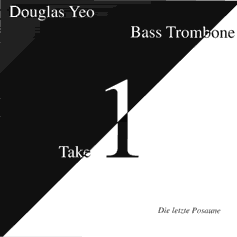 3rd Position
3rd Position
What is your secret to a beautiful legato? Doug Yeo
Relaxation. Keep your wrist relaxed. Our body is made of hinges. Use the hinges closest to the slide before your use any hinges further away. So use your fingers before your wrist, use your wrist before your elbow, use your elbow before your shoulder. Too many players move their slide only with their elbow because their right wrist is frozen. We articulate with air and tongue and valve – not with the hand slide. So make your slide motion relaxed and easy – whether you’re playing legato or marcato. Then remember this: warm air = warm sound; cold air = cold sound. In most legato playing, we want warm sound – keep the tongue relaxed like you’re yawning (one of the basis points of my teacher – Edward Kleinhammer – and his pedagogy) .
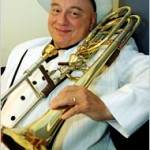 4th Position Charlie Vernon
4th Position Charlie Vernon
What helps you achieve musical expression?
Singing every note from my soul.
4th Position James Markey
What helps you achieve musical 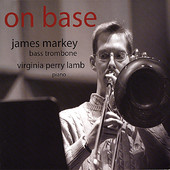 expression?
expression?
Once again, the key here is listening. Music is a language. If you want to learn how to speak French beautifully, you have to live in France. Sure, recording yourself speaking French can be a great tool, but if you don’t actually know what French should sound like, you’re not going to get very far! And you mustn’t take it for granted that you understand good phrasing and musicianship. We ALWAYS have much to learn about things one COULD do to sound beautiful. Once you have this vocabulary, you can put it together to form “musical sentences”. But if you don’t know the words, or decide that you like the word “dinosaur” instead of “sandwich”, you’re going to confuse a lot of people when you start talking about lunch!
5th Position Chris Brubeck
Name two inspirations. One musical and one non-musical.
I know in my case it’s a rather predictable response but I would be fooling myself if I didn’t admit that my father, his talent, his musical eclecticism and hard work ethic, were a major influence on the kind of musician and composer that I have become. I know you only asked for two inspirations but I’m going to also throw in that I was deeply inspired by the Beatles and also by Bach and Stravinsky. For a non-musical inspiration, I think I’d have to pick Mark Twain. I have loved reading his works since I was a kid and got re-acquainted with him a few years ago when I was commissioned to write a piece based on his life. Twain had a deep social conscience and used his abundant imagination and sense of humor to make powerful insights into the American psyche.
6th Position-Chris Brubeck
What challenges and attributes does the bass trombone bring to small group jazz?
Sometimes it’s hard for people who are not trombone players to understand and utilize the differences between 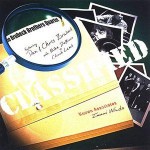 bass and tenor trombone. Depending on the player, usually a bass trombone player can’t be expected to pull off all of the “traditional” tenor sax and trombone leads in the bop jazz combo setting. Yet, if you do it right, it can be a fine instrument in a small ensemble. On the other extreme end of the spectrum, I used to play with a horn funk band sometimes and be asked to replace the bari sax functions in a Tower of Power-like horn section. That was challenging and fun. There was a lot of funky huffing and puffing!
bass and tenor trombone. Depending on the player, usually a bass trombone player can’t be expected to pull off all of the “traditional” tenor sax and trombone leads in the bop jazz combo setting. Yet, if you do it right, it can be a fine instrument in a small ensemble. On the other extreme end of the spectrum, I used to play with a horn funk band sometimes and be asked to replace the bari sax functions in a Tower of Power-like horn section. That was challenging and fun. There was a lot of funky huffing and puffing!
6th Position-Doug Yeo
As someone trained in the ‘Chicago-Style’, how would you assess the strengths of that approach? What modifications have you made to it?
It is usually misunderstood. I trained under Edward Kleinhammer who played bass trombone in the Chicago Symphony from 1940-1985. Many people think that great brass section he played in (what I call, “old Chicago” to differentiate it from the current, “new Chicago” section) was all about playing loud and long. Actually, they were about unity of concept. From Adolph Herseth on first trumpet to Arnold Jacobs on tuba, the old CSO brass section played with unanimity of concept. The whole was much greater than the sum of the parts. Today, we usually hear orchestra sections made of tremendous players but they don’t add up to be better than the individuals because too many individual voices are competing for attention. I have tried to be purposely contextual in my playing.
Why do you think that the bass trombone is such a compelling solo bass instrumental voice and what are its closest rivals?
(You, of course, have assumed I find it a compelling solo voice!) I find the beauty of its rich sound, with its wide range and expressive quality to be unique. The bass trombone is really just starting to get some music written for it. And it has no rivals!
7th Position Doug Yeo
Most musicians meet their limitations. You seem to be a rare individual who has succeeded as an ensemble player, a conductor, a soloist, a writer, and an educator. How do you do it?
I don’t do it. God has done it. I have an insatiable curiosity and that has led me down many rabbit trails in life. These trails have led me to a life filled with discovery and wonder. I still sleep 8-9 hours a day. I learned long ago that if I am tired, ill or dead, I can’t do anything. I have tried to help people discover their own joys in living. I don’t think I ever set out to purposely do all that I have accomplished; truly I have tried to faithfully follow God’s leading in my life and it has taken me to some unexpected places. I find it remarkable, and feel very blessed.
7th Position-Gerry Pagano
Is there any musical setting where you can imagine, or would like to see the bass trombone put to greater use?
I would like to see greater use of the bass trombone in small chamber settings, and not just with other brasses.
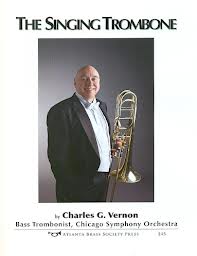 7th Position, Charlie Vernon
7th Position, Charlie Vernon
What would it surprise people to know about Jacobs, Kleinhammer, Crisafulli, and Friedman?
Four different styles of playing all going for a similar result.
T1 Jeremy Morrow
Best trombone playing you’ve ever heard?
Perhaps most moving trombone solo performance I ever heard was Dave Taylor at the Summer Trombone Workshop in Philadelphia. He played arrangements of Schubert lieder that nearly made me cry. The best orchestral trombone playing I’ve heard live was a Chicago Symphony Bruckner 8 performance – there was so much passion and power; I’ll never forget it.
T2 Best playing you’ve ever done? Tom Evrett
My most satisfying (and single moment of perfection) occurred as a member of a ITW faculty trombone choir (twenty-one players) backing up guest soloist Urbie Green. Tom Streeter and I shared a bass trombone part. At the end of one ballad, we played a soft low C (below the bass clef) on the sustained final C chord. The chord was absolutely perfect. As Tom and I looked down the ensemble to acknowledge the bass trombonists that had simultaneously produced the C an octave higher, we realized that it was George Roberts and Lewis Van Haney! Doesn’t get any better than that.

